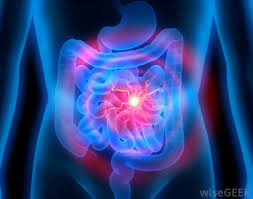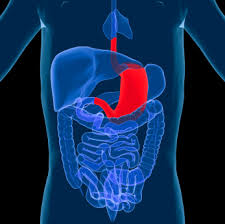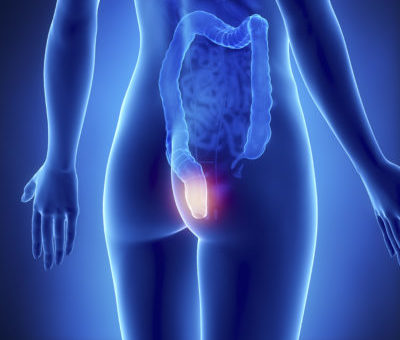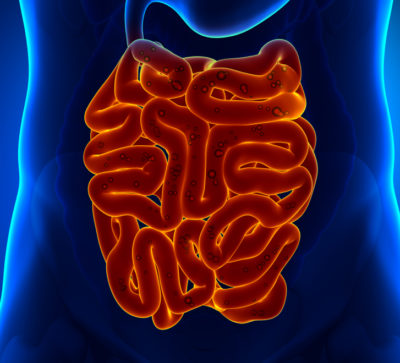
Barrett’s esophagus, also known as Barrett’s disease, is a disorder in which perpetual exposure to stomach acid causes injury to the cells of the lower esophagus. Left untreated, Barrett’s esophagus raises a patient’s risk of developing esophageal cancer by up to 80 percent… Read More

Celiac disease (CD) is a common, yet potentially life threatening, disorder which can easily be under diagnosed or misdiagnosed. Three million Americans are living with Celiac Disease, but only 17% of them realize they have it! Celiac Disease is an autoimmune disorder that causes an abnormal response to glutens—proteins found in wheat, barley, and rye. The immune system’s reaction to… Read More

Colon and rectal polyps are abnormal growths rising from the lining of the large intestine or the rectal canal. Polyps are the most common condition affecting the colon and rectum. They appear in about 15 to 20 percent of adults. Some polyps are flat, while others have more shape. Polyps of the colon and rectum are usually benign, which means they are not cancerous… Read More

Most people endure the occasional bout of constipation. However, if you’re experiencing three or fewer bowel movements a week or regular difficulty passing stool, you may be suffering from a more serious condition known as chronic constipation. While lifestyle changes are usually sufficient to relieve constipation, the condition can sometimes be indicative of a more serious problem. Read More

Crohn’s disease is a form of inflammatory bowel disease which can involve any part of the digestive tract (mouth to anus). Unlike ulcerative colitis, which only involves the colon, patients with Crohn’s disease may demonstrate healthy sections of colon and rectum as well. Accurately diagnosing the severity of Crohn’s disease from which a patient suffers is essential to identifying the appropriate method of treating the disease… Read More

We have all probably experienced some form of diarrhea at one point. Diarrhea describes semi-frequent loose and watery bowel movements that occur as a result of a virus or other gastrointestinal issue. Diarrhea is very common and is often not serious. It can typically be treated by consuming lots of fluids and by taking over-the-counter medicine. If diarrhea persists for more than two days, however, it is considered prolonged and can be a sign of a more serious medical issue. Read More

Have you ever experienced difficulty swallowing, or had the feeling that food is stuck in your throat or chest? Trouble swallowing, also known as dysphagia, can be a sign of a problem in your throat or esophagus. The esophagus help move foods and liquids from your mouth to the stomach, and dysphagia usually stems from an issue within the esophagus. Difficulty swallowing is… Read More

Esophageal cancer is a disease that affects the esophagus—the tube connecting the mouth and the stomach through which food passes during swallowing. Cancer in this area of the body usually begins in the lining of the esophagus and travels deeper into the tissue over time as the lesion turns into a tumor. Tobacco use and excessive alcohol intake increase the risk of cancer in the upper esophagus… Read More

Fatty liver is a condition that occurs when abnormal quantities of fat accumulate in the liver. These fatty deposits start out small, but can grow large enough to create cysts (irreversible lesions). The most common factors leading to fatty liver are excessive alcohol intake and obesity. Patients with insulin resistance, high cholesterol, hypertension, and other markers of metabolic syndrome may be particularly… Read More

Dietary fructose intolerance or fructose malabsorption is a digestive disorder that occurs when the small intestines cannot absorb a normal amount of fructose in the diet. While the average person has a limit on the amount of fructose they can comfortably digest in one sitting, a patient with dietary fructose intolerance has a much lower threshold. Excess, undigested fructose can ferment… Read More

Gas and bloating are issues that affect everyone. There are many factors that can be involved. Habits such as eating too quickly can cause you to swallow air, leading to bloating and belching. Intestinal fermentation of undigested carbohydrates (including as those found in beans) is a common cause of flatulence. Read More

Experiencing the occasional bout of acid indigestion after a meal is not uncommon. However, persistent heartburn and reflux could be signs of a more serious condition known as gastroesophageal reflux disease, or GERD. Patients who experience reflux more than twice a week should not hesitate to visit Dr. Berookim for a consultation.Dr. Berookim offers various procedures to test for GERD and other conditions of the esophagus at his office in Beverly Hills. Two of the most common diagnostic techniques are EGD and capsule endoscopy. Read More

Hemorrhoids are swollen and inflamed veins around the anal canal or rectum. Though hemorrhoids are often not serious, they are a common problem as they can become uncomfortable and painful if not treated. The rectum leads to the anus and completes the final stage of the digestive tract, so hemorrhoid symptoms often become evident during your bowel movements. If you have noticed discomfort… Read More

The esophagus runs from the mouth to the stomach and passes through an opening in the diaphragm. This opening is called a hiatus. In some individuals, the stomach can protrude through the hiatus and cause a condition known as a hiatal hernia… Read More

Often contracted during childhood, H. pylori, also known as Helicobacter pylori, is a bacterial infection located in the stomach. While many people with H. pylori demonstrate no symptoms, doctors estimate that half the world’s population is infected… Read More

Irritable Bowel Syndrome
Commonly known as IBS, irritable bowel syndrome is a disorder in which the colon is especially sensitive to the natural contractions that help food pass through the intestines. Left untreated, the condition can cause a great deal of pain as well as emotional distress and inconvenience. If you’ve been suffering from unexplained GI symptoms, feel free to visit the Gastroenterology… Read More

Lactose intolerance is a common digestive disorder that occurs when the small intestine cannot break down lactose—the natural sugar found in dairy products like milk, ice cream, cheese, and yogurt. This condition is not a food allergy. It can occur at any age, but it usually develops during adolescence or adulthood… Read More

If you have noticed blood in your stool, blood on used toilet paper, or blood in your toilet bowl, then you are suffering from rectal bleeding. Often an unnerving discovery for patients, rectal bleeding refers to blood that passes through your anus. While rectal bleeding usually comes from your lower colon or rectum, it can occur for various reasons including hemorrhoids, IBD, polyps and cancer. If you’ve been suffering from… Read More

Small intestine bacterial overgrowth (SIBO) is a dysfunction of the small bowel that allows bacteria to proliferate above normal levels. Unlike the colon, which should contain a lot of highly active bacteria, a healthy small intestine is not heavily colonized. Bacteria can accumulate in the small intestine if there is damage from inflammation or any obstruction that prevents food from being moved through the intestine with ease… Read More

Stomach cancer, also know as gastric cancer, can affect any part of the stomach, but most commonly involves the stomach lining. Stomach cancer is treatable if detected in its early stages. If you’ve been suffering from unexplained abdominal pain, unexplained weight lossor black stools, do not hesitate to visit the Gastroenterology Institute of Southern California for a consultation…. Read More

Heath problems affecting the small intestine can have a profound impact on the way you live your life. A type of irritable bowel disease (IBD), ulcerative colitis affects the inner lining of your large intestine and rectum and causes a number of unpleasant symptoms. If you are suffering from troubling digestive symptoms or changes in bowel habits, don’t hesitate to visit a board-certified gastroenterologist like… Read More

